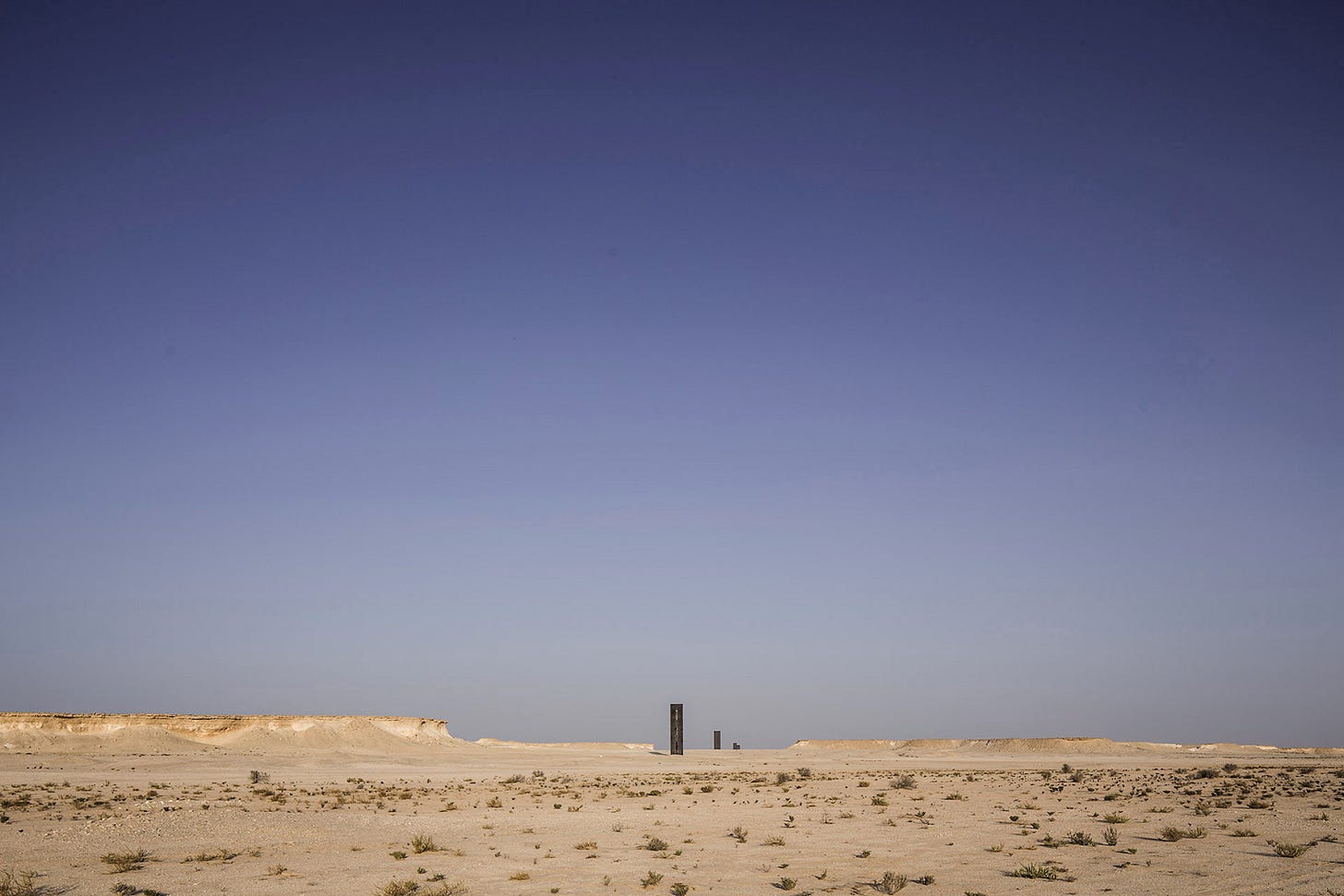Colin here. Hello from Doha, the capital of resource-rich Qatar. I’ve visited the country several times in the past, and frequently fly through on their national airline, which is one of the best in the world.
The airport offers top-notch people watching, with lots of countries and operating systems colliding, often in the middle of the night, as people head for their connections and linger over duty free. Migrant workers from Bangladesh scramble past Qataris in perfectly white national dress. Security contractors come equipped with wrap-around shades and telltale Merrell boots while American businessmen dress as if they went a little too deep on the shopping spree at REI for their big trip. Once you step outside of customs and into Doha, you see a manicured road from the airport that feels inspired by the first impressions delivered by Singapore, a competitor in the luxury country battle. In addition to the summer heat, you can feel the breakneck pace of development with lots of new hotel projects (including a Baccarat) and a wide array of government-sponsored infrastructure (including a subway system). There’s a pace and hum that feels surprising in the middle of the desert, and it’s all built with migrant labor, serious deadlines, and often questionable labor practices.
Why is this interesting?
It is easy to forget that this place is still under a huge economically-crippling blockade. Trade is halted with major regional economies Saudi Arabia and the UAE over accusations of support for the Muslim Brotherhood amongst other things. There’s no direct flights between Abu Dhabi and Doha and in the past on approach to the country I watched the pilot weave over UAE airspace like a game of Operation. Qatar has since pivoted a lot of its trade to Turkey and Iran, and has managed to keep up appearances in the world through the seemingly magical power of influencers and soft diplomacy.
The country recently opened the Qatar National Museum, a feat of architecture and ambition. It stands near the Islamic Art Museum, designed by IM Pei and featuring a Richard Serra perched outside on the water. There’s also a Serra installation in the middle of the desert, which is one of the most brilliant pieces I’ve seen.

The cultural cachet this small country is able to conjure up is interesting. Obviously, well-travelled and deep pocketed Qataris have social networks in London, Paris and beyond. But it’s the investment in the arts that is, rightly or wrongly, buying a lot of support from the global elite who don’t mind a junket replete with a cold towel and a glass of champagne on the flight. The list of attendees for the Museum’s recent opening is a global who’s who: “Victoria Beckham came from London. Diane von Furstenberg and Alexander Wang from New York. Pierpaolo Piccioli of Valentino flew in from Rome, while Olivier Rousteing of Balmain and Giambattista Valli came from Paris. So did Carla Bruni, with her husband, former President Nicolas Sarkozy of France, firmly in tow.”
What’s fascinating is that while this blockade is new, it’s actually fits into a strategy the Qataris have been operating on for two decades:
In a bid to diversify away from a carbon-based economy, Qatar has taken stakes in a wide variety of things, including the French soccer team Paris St. Germain and London’s Heathrow Airport, along with global finance, health care, technology and auto companies.
It has made major donations to universities, including Georgetown and Carnegie Mellon, building sister campuses across Doha, and developed a London property portfolio larger than that of Queen Elizabeth II of Britain, according to a report in The Telegraph. The jewel in that portfolio is the Shard, the tallest building in western Europe. And that is just the beginning.
And while we won’t delve into the domestic politics behind the blockade other than to say then Secretary of State Rex Tillerson didn’t know until after it happened (despite the US having a strategically important air base in the country), it's interesting to see how well the country has fared in the process. There’s signs of some sort of movement towards resolution with Qataris attending regional summits. But it is truly insane to think about how long this full on blockade has gone on, without a lot of the world noticing at all. (CJN)
Tip of the Day:
A lot of people know you can email PDFs to your Kindle (you can find the address here). What most people don’t know is that if you include the word “convert” in the subject line it will suck the text out of the PDF and put it into a document so everything flows like a regular Kindle book. It’s not always pretty as PDFs can be a pain in the ass, but it’s a helpful little trick to have around. (NRB)
Quick Links:
Sports and fashion have been merging for the last few years. Few places is this more evident than the NBA, where each night offers red carpet opportunities (few players epitomize this better than Russell Westbrook, discussed in WITI 5/24 - The Westbrook Edition). To that end, it was interesting to see custom suit brand Indochino sign a deal with New York Knicks rookie RJ Barrett. “Under the terms of the deal with Indochino, Barrett will be featured in the company’s campaigns and the brand will create an exclusive RJ Barrett collection of custom apparel and customizations that will be released to coincide with his expected season debut in the NBA for the 2019-20 season.” (NRB)
Back in May the podcast 99% Invisible did an episode on how libraries weed out their books. Turns out they use an acronym called MUSTY: Misleading, inaccurate, out of date, Ugly, Superseded, Trivial, and Your collection (“This book is no longer appropriate for your current passion”). (NRB)
From Lit Hub’s Book Marks site: The Best Reviewed Books of 2019 (So Far). (NRB)
Thanks for reading,
Noah (NRB) & Colin (CJN)


